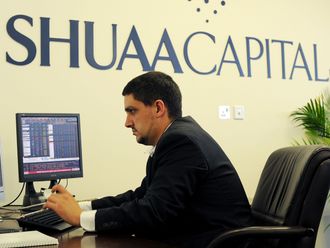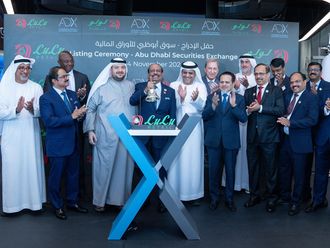Abu Dhabi: Capital markets regulator the Emirates Securities and Commodities Authority (SCA) is expected to allow short-selling on UAE markets next year, the Dubai Financial Market's Chief Executive Officer Eisa Kazim said yesterday.
"SCA has posted a consultation paper. It would be introducing rules governing short-selling, stock lending and borrowing," Kazim told reporters on the sidelines of the Arab Federation of Exchanges Annual Conference in Abu Dhabi.
"I expect allowing short-selling would help improve liquidity in the markets," Kazim added.
Separately, Kazim said he doesn't see any difficulty in the UAE securing an upgrade to emerging market status at index provider MSCI Inc.
MSCI plans to announce on December 14 at 11pm Central European Time its decision whether to raise the UAE and Qatar to emerging market from frontier status.
Abdullah Al Suweilmy, chief executive officer of Saudi Arabia's Tadawul, the region's biggest stock market, said the country hasn't yet decided on a timeline for opening up the market to foreigners.
Conference
The two-day conference will tackle several issues that are important to the Arab exchanges such as the integration of GCC markets, developing the regional role of Arab brokerage firms, management of Arab exchanges in times of crises, and the role of Arab exchanges in national and regional economies.
The Arab Federation of Exchanges (AFE) has partnered with S&P Indices to launch the S&P AFE 40 index, it was announced during yesterday's conference.
S&P AFE 40 is designed to measure and evaluate the performance of the 40 most powerful companies in the Pan-Arab region.
Comprising companies from Bahrain, Egypt, Jordan, Kuwait, Lebanon, Morocco, Oman, Palestine, Qatar, Saudi Arabia, Tunisia and the UAE, the index will be a new benchmark for investors. It will provide a better gauge and predict economic trends in the region, and in relation to the global market.
Timely response
"We expect S&P AFE 40 to be a blue chip index in the pan-Arab region—one that will genuinely represent the performance of leading, publicly-traded companies trading on Arabian exchanges. It is a vital and timely response to investors seeking to measure this important, growing segment of the market," said Fadi Khalaf, Secretary General at the Arab Federation of Exchanges.
The S&P AFE 40 covers the 40 largest stocks—as measured by the float-adjusted market capitalisation—listed on AFE member exchanges.
They are subject to the following restrictions: Each stock must have at least $50 million in value traded over a 12-month period; there can be no more than 10 stocks per country, based on domicile; at least one stock from each country must be included.
In terms of weighting, the S&P AFE 40 uses a capped market capitalisation weighted index scheme in which the maximum weight of any constituent cannot exceed 10 per cent and the maximum weight for each country based on domicile cannot exceed 35 per cent.












